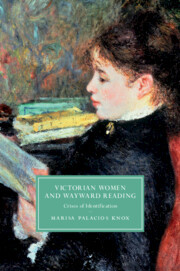Description
Victorian Women and Wayward Reading
Crises of Identification
Cambridge Studies in Nineteenth-Century Literature and Culture Series
Author: Palacios Knox Marisa
Explains how Victorian women readers strategically identified with literature to defy stereotypes and inspire their action and creativity.
Language: EnglishApproximative price 30.28 €
In Print (Delivery period: 14 days).
Add to cart
Victorian Women and Wayward Reading
Publication date: 11-2022
Support: Print on demand
Publication date: 11-2022
Support: Print on demand
Approximative price 102.80 €
In Print (Delivery period: 14 days).
Add to cart
Victorian Women and Wayward Reading
Publication date: 10-2020
250 p. · 23.5x16 cm · Hardback
Publication date: 10-2020
250 p. · 23.5x16 cm · Hardback
Description
/li>Contents
/li>Biography
/li>
In the nineteenth century, no assumption about female reading generated more ambivalence than the supposedly feminine facility for identifying with fictional characters. The belief that women were more impressionable than men inspired a continuous stream of anxious rhetoric about ?female quixotes?: women who would imitate inappropriate characters or apply incongruous frames of reference from literature to their own lives. While the overt cultural discourse portrayed female literary identification as passive and delusional, Palacios Knox reveals increasing accounts of Victorian women wielding literary identification as a deliberate strategy. Wayward women readers challenged dominant assumptions about ?feminine reading? and, by extension, femininity itself. Victorian Women and Wayward Reading contextualizes crises about female identification as reactions to decisive changes in the legal, political, educational, and professional status of women over the course of the nineteenth century: changes that wayward reading helped women first to imagine and then to enact.
1. Masculine identification and marital dissolution; 2. Novels without heroines: sensation and elective identification; 3. Character invasion and the Victorian actress 4. Antipathetic telepathy: female mediums and reading the enemy; 5. 'The valley of the shadow of books': the morbidity of female detachment; 6. The new crisis: can we teach identification?
Marisa Palacios Knox is Assistant Professor of Literatures and Cultural Studies at the University of Texas Rio Grande Valley, where she is also affiliate faculty with the Gender and Women's Studies Program. She has published articles in Victorian Poetry, Nineteenth-Century Literature, and Literature Compass.
© 2024 LAVOISIER S.A.S.





